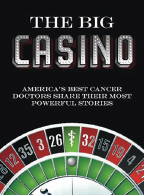
The following essay by Shaker R. Dakhil, MD, FACP, is adapted, with permission, from The Big Casino: America’s Best Cancer Doctors Share Their Most Powerful Stories, which was coedited by Stan Winokur, MD, and Vincent Coppola and published in May 2014. The book is available on Amazon.com and thebigcasino.org.
On a visit to Disneyland, I stood in a long line, waiting to ride the iconic Space Mountain attraction. If you’re not familiar with the ride, it is essentially an indoor roller coaster amped up by blasting rock music, flashing strobe lights, and other special effects designed to create the illusion of plunging blindly and uncontrollably into total darkness—a terrifying experience. Unlike other roller coasters where, eyes wide open, you can see what’s coming and brace yourself for the downhill plunges and actually catch your breath on the slower uphill climbs, Space Mountain is nonstop blind terror. In fact, since I took that ride, I’ve had an abnormal echocardiogram. Later, I was surprised to learn there are sections of Space Mountain where the car moves at only 5 mph. Things are just not the same in the dark.
A cancer diagnosis is like riding a roller coaster in the dark. Things begin moving vertiginously, but the more you see and the more you learn and prepare yourself, the better you’ll do. When I was training in Lebanon, I was advised not to tell my patients anything about their disease, because they “would not be able to handle it.” Experience suggests the opposite is true. Until you master the facts and face your cancer, you’ll have difficulty coping with what is—let me be clear—a wild ride physically and emotionally.
Cancer equals stress. Think of all the unknowns, the misperceptions, and sometimes the outright paralysis associated with the disease. It’s not for nothing that cancer was deemed the “Emperor of All Maladies” in past centuries. A way to reduce stress is to bring expectations and results into balance. One obvious possibility is to achieve more—and here you have all of modern medicine battling on your side—another is to set your expectations right.
Managing Expectations
When what you achieve is very close to what you expect, you’re winning. If you expect a cure, and achieve partial remission, you’ll be stressed out. Expecting partial remission and achieving a complete one is a much happier situation. This guidance also applies to one’s ability to expect or tolerate side effects. For example, if there’s a 50:50 chance you will lose your hair, I’ll say, “Most likely you’ll lose your hair.” If you don’t, you’re ecstatic. Why risk disappointment and further stress?
It takes a lot of strength to stay positive. In my experience, it requires a leap of faith—religious, spiritual, or personal.— Shaker R. Dakhil, MD, FACP
Tweet this quote
Setting expectations without destroying hope is a challenge. I counsel my patients that these are totally different concepts. Expectation is quantifiable. I can say to a patient, “With this drug, we can expect a 30% response rate.” On the other hand, I cannot tell a patient what to hope. Hope is more mystical, spiritual, and philosophical. We all have the right to hope. If the expectations for a particular treatment are pessimistic, you absolutely have the right to go for it. You have the right, indeed the obligation, to believe you’ll be the one who beats the odds.
God knows I’ve seen many patients who’ve shattered negative expectations. When your doctor talks to you, it should be about expectations. It is up to you to formulate the amount of hope you want. You have every right to hope for a miracle.
Cancer survivors must also find ways to cope. How do you live with the fear your disease may recur in the future? How can you lead a normal life knowing you are at risk? It takes a lot of strength to stay positive. In my experience, it requires a leap of faith—religious, spiritual, or personal. Religion offers the promise of hope. In the Bible, Matthew instructs us “not to worry about tomorrow” because tomorrow will be taken care of. Another wise man counsels, “Live your life as if you were living forever, but be prepared to go as if you were going tomorrow.” To me that is a very beautiful concept.
Appreciating Life
One day in my clinical practice, I asked one of my critically ill patients, “Ed, are you afraid to die?”
“No, doctor,” he said simply. “When I go to sleep, there are two alternatives. Either I wake up in the presence of my wife and children, or I wake up in God’s presence. Both are beautiful to me.”
I’d never heard this said by a living person. I’d read it, of course, but here it was in the place you might least expect to see such hope, childlike and trusting in its purity, a cancer ward. Ed taught me something incredibly important. I tell my patients to avoid unanswerable questions like “Why cancer? Why me? Why do bad things happen to good people?” I remind them, as I remind myself, “Don’t ride the roller coaster in the dark. Open your eyes to the richness of life.” ■
Dr. Dakhil is President of Cancer Center of Kansas; Clinical Professor of Medicine at the University of Kansas, Wichita; and principal investigator of the Wichita National Cancer Institute Community Oncology Research Program.

